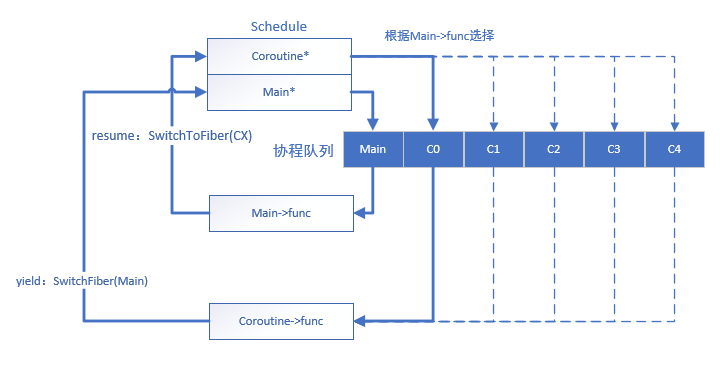// coroutine.c
#include "stdafx.h"
#include <stdio.h>
#include <stdlib.h>
#include <windows.h>
#include <assert.h>
#include "coroutine.h"
/* windows fiber版本的协程yield的时候直接切换到主协程(main),
而不是swapcontext的切换到上次运行协程,但最后达到的结果却一样
*/
// 默认容量
#define DEFAULT_CAP 8
// 堆栈大小
#define INIT_STACK 1048576 //(1024*1024)
typedef struct schedule schedule;
typedef struct coroutine coroutine;
typedef struct coroutine_para coroutine_para;
struct schedule
{
int cap; // 容量
int conums;
int curID; // 当前协程ID
LPVOID main;
coroutine **co;
};
struct coroutine
{
schedule *s;
void *ud;
int status;
LPVOID ctx;
coroutine_func func;
};
static int co_putin(schedule *s, coroutine *co)
{
// 容量超过就扩容
if (s->conums >= s->cap)
{
int id = s->cap;
s->co = realloc(s->co, sizeof(coroutine *) * s->cap * 2);
memset(&s->co[s->cap], 0, sizeof(coroutine *) * s->cap);
s->co[s->cap] = co;
s->cap *= 2;
++s->conums;
return id;
}
else
{
for (int i = 0; i < s->cap; i++)
{
int id = (i + s->conums) % s->cap;
if (s->co[id] == NULL)
{
s->co[id] = co;
++s->conums;
return id;
}
}
}
assert(0);
return -1;
}
static void co_delete(coroutine *co)
{
//If the currently running fiber calls DeleteFiber, its thread calls ExitThread and terminates.
//However, if a currently running fiber is deleted by another fiber, the thread running the
//deleted fiber is likely to terminate abnormally because the fiber stack has been freed.
DeleteFiber(co->ctx);
free(co);
}
schedule *coroutine_open()
{
schedule *s = malloc(sizeof(schedule));
s->cap = DEFAULT_CAP;
s->conums = 0;
s->curID = -1;
s->co = malloc(sizeof(coroutine *) * s->cap);
memset(s->co, 0, sizeof(coroutine *) * s->cap);
s->main = ConvertThreadToFiberEx(NULL, FIBER_FLAG_FLOAT_SWITCH);
return s;
}
void coroutine_close(schedule *s)
{
for (int i = 0; i < s->cap; i++)
{
coroutine *co = s->co[i];
if (co) co_delete(co);
}
free(s->co);
s->co = NULL;
free(s);
}
void __stdcall coroutine_main(LPVOID lpParameter)
{
schedule* s = (schedule*)lpParameter;
int id = s->curID;
coroutine *co = s->co[id];
(co->func)(s, co->ud);
s->curID = -1;
--s->conums;
s->co[id] = NULL;
//co_delete(co);
SwitchToFiber(s->main);
}
int coroutine_new(schedule *s, coroutine_func *func, void *ud)
{
coroutine *co = malloc(sizeof(coroutine));
co->s = s;
co->status = COROUTINE_READY;
co->func = func;
co->ud = ud;
int id = co_putin(s, co);
co->ctx = CreateFiberEx(INIT_STACK, 0, FIBER_FLAG_FLOAT_SWITCH, coroutine_main, s);
co->status = COROUTINE_READY;
return id;
}
void coroutine_resume(schedule *s, int id)
{
assert(id >= 0 && id < s->cap);
if (id < 0 || id >= s->cap) return;
coroutine *co = s->co[id];
if (co == NULL) return;
switch (co->status)
{
case COROUTINE_READY:case COROUTINE_SUSPEND:
co->status = COROUTINE_RUNNING;
s->curID = id;
SwitchToFiber(co->ctx);
if (!s->co[id]) co_delete(co);
break;
default:
assert(0);
break;
}
}
void coroutine_yield(schedule *s)
{
int id = s->curID;
assert(id >= 0 && id < s->cap);
if (id < 0) return;
coroutine *co = s->co[id];
co->status = COROUTINE_SUSPEND;
s->curID = -1;
SwitchToFiber(s->main);
}
int coroutine_status(schedule *s, int id)
{
assert(id >= 0 && id < s->cap);
if (id < 0) return;
if (s->co[id] == NULL) {
return COROUTINE_DEAD;
}
return s->co[id]->status;
}
int coroutine_running(schedule *s)
{
return s->curID;
}






